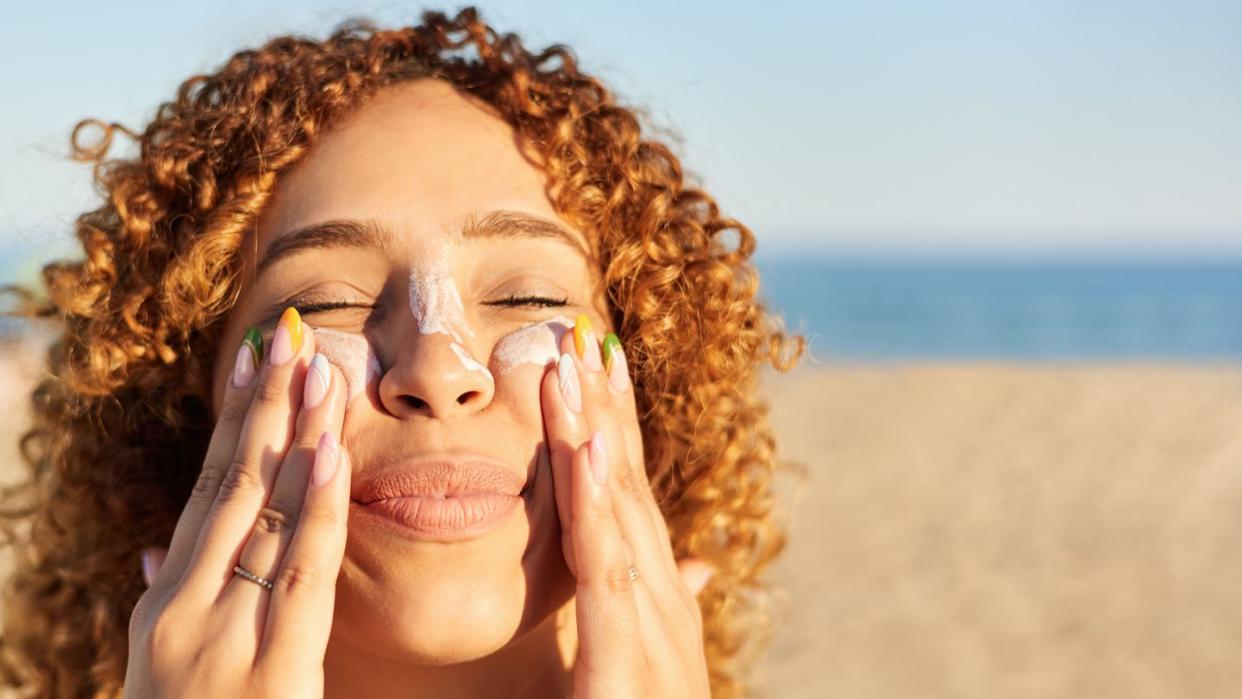Dermatologists Recommend This SPF Level Above All Others for Every Complexion

Most of us know to slather on sunscreen before we spend a day outdoors to help protect against wrinkles, sun spots, and skin cancer, but it can be tricky to know the best SPF for every skin type to use.
As you shop for the best sunscreen to pack in your beach bag, it's good to know that many sunscreens are now formulated with skincare ingredients that can help balance your complexion and protect against sun damage. Keep in mind, too, that reapplying sunscreen often is just as important as the type and level of SPF you choose. Finally, to make using sunscreen a daily habit, try to pick one that's within your budget so that you’re motivated to use it regularly and reapply as needed — this is one skincare product to stock up on!
Read on for what dermatologists want you to know about the best SPF for every skin type, so you can stay protected from the harsh rays all year round.
What is the best SPF level to use?
While there may be a dizzying number of sunscreen options on drugstore shelves, dermatologists usually recommend using SPF 30 or above. SPF 50 is better if you burn easily or are outdoors for long periods. You should plan to reapply SPF 50 sunscreen every 40-80 minutes.
Look for a sunscreen with broad-spectrum protection, as this offers the best defense against harmful UVA and UVB rays. You should also enhance your sun protection by wearing big hats and sun-protective clothing, according to Dr. Jeannette Graf, a board-certified dermatologist and assistant clinical professor of dermatology at Mount Sinai School of Medicine.
What's the difference between chemical and mineral sunscreen?
The two major types of sunscreen are chemical and mineral sunscreen. They both help protect against sun damage, but they work in slightly different ways.
“[Mineral sunscreens] act as a physical barrier to protect you from the sun’s rays, while chemical sunscreens will absorb into the skin,” says Dr. Michael I. Jacobs, a board-certified dermatologist and associate professor of dermatology at Weill Cornell Medical College. This is why mineral sunscreens can feel a little thick — they're meant to sit on top of the skin instead of blending in like a lotion.
Fortunately, no matter which type you choose, both experts confirm that chemical and mineral-based sunscreens are equally effective when used as directed.
The Best Sunscreen Types for Every Skin Type
As important as it is to wear sunscreen, you may have had less-than-ideal experiences with formulas that clog pores, dry you out, or leave a white cast on your complexion. Luckily, there are many options available now that actually can provide benefits tailored to your skin's needs.
Oily/Combination Skin
People who struggle with acne should “opt for a gel sunscreen or one that is specifically formulated for oily skin,” says Dr. Jacobs. He adds that an oil-free, non-comedogenic formula with a matte finish and lightweight texture will work best.
Dry Skin
For dry skin, Dr. Jacobs recommends a hydrating, thick, cream-textured sunscreen. Look for one that includes protective skincare ingredients like hyaluronic acid, ceramides, and glycerin.
Sensitive Skin
If you have sensitive skin, both experts agree that fragrance-free, mineral-based sunscreens (like those containing zinc oxide) are the best to use. Mineral-based sunscreens are less likely to irritate compared to chemical sunscreen because the formula sits on top of the skin instead of absorbing into it.
Darker Skin Tones
Although mineral-based sunscreens that contain zinc oxide are effective at protecting skin from sun damage, they can have the unfortunate side effect of leaving a white or bluish cast on the skin, which is a major issue for those with deeper skin tones.
While this isn't the case with all formulas, it happens more commonly with mineral-based sunscreens than it does for chemical sunscreens. Dr. Jacobs suggests looking for gel-based sunscreen formulas that say “invisible” or “non-whitening” on the label.
There are also many user-favorite sunscreens for dark skin available that eliminate this problem.
Babies and Children
For protecting little ones, our experts recommend using mineral-based formulas that are made specifically for babies or kids, since mineral-based sunscreen provides a physical block from UV rays. Dr. Graf also stresses the importance of dressing babies in UPF-rated clothing while outdoors.
Should you use different sunscreens on the face and body?
Our experts say that while some sunscreen formulas may be appropriate for both the face and body, in general, they are not interchangeable.
Facial sunscreens may include ingredients to prevent acne flare-ups or stinging the eyes. Also, body sunscreens are often found in spray form, which can contain alcohol and other chemicals that are not good for the face. So, it’s best to keep those separate.
You Might Also Like

